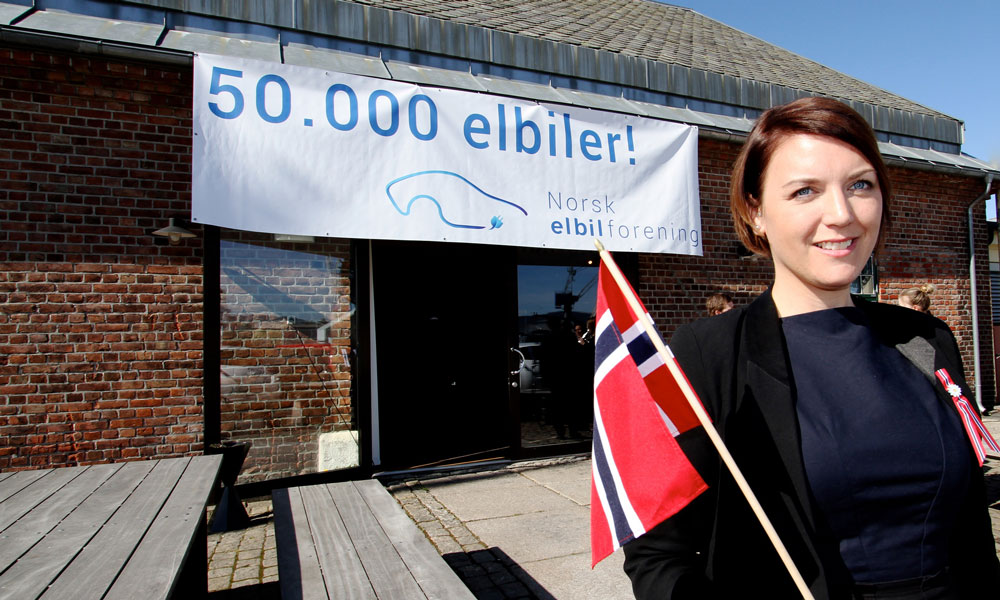
Who Saved the Electric Car? Norway, That’s Who
In the face of international indifference, the Scandinavian country has been one of the brightest lights in pushing for the use of electric vehicles. And an industry group in the region has been a big reason for its success.
The world’s most electrified auto market didn’t rev its engines overnight, but things are well into gear today.
It took a lot of work and a lot of subsidies for Norway to become a major electric-vehicle success story, and a trade group has been active on that journey nearly the entire way. The two-decade-old Norwegian Electric Vehicle Association (ELBIL) represents an industry that has strong support from a relatively small population of slightly more than 5.2 million.
In July the enthusiast blog EV Obsession noted that 23 percent of new cars sold in the country in June were electric, representing a massive share of the marketplace.
Last month the country hit a record of 66,000 electric vehicles on the road, far exceeding official estimates of 50,000 such cars being driven by late 2017. Norway is currently the world’s fourth-largest in terms of electric-vehicle sales, according to HybridCars, an impressive feat considering that the top three countries are the United States, China, and Japan—all of which dwarf Norway’s population of a little more than 5.2 million.
The surprising results are leading the association to eye an even bigger goal—100,000 electric cars on the road by 2020.
“Aiming high is necessary to get a sustainable market for electric cars and the charging infrastructure in Norway,” ELBIL noted in a recent blog post. “Today, electric cars constitute for between 17-20 percent of new passenger cars sold in Norway each month. We still have a long way to go before all fossil cars are replaced with zero emission cars.”
Strong Subsidies Play a Role
What’s making the big difference? Simply put, an electric car is a really great deal if you’re looking to avoid extra taxes.
Norway offers the highest level of incentives in the world for electric vehicles, including no taxes on new cars and no fees for toll roads. This generous package cuts the price of a new vehicle by nearly 17,000 euros, according to the New York Times. (The United States, by comparison, offers subsidies less than a third of that size.) Norway also places a significant level of taxes on new gasoline-based vehicles—taxes that, at the moment, electric vehicle owners aren’t on the hook for.
With the help of these subsidies, Norway is creating an unusual dichotomy between gasoline and electric vehicles that may be difficult to replicate elsewhere.
In comments to The New York Times, ELBIL Secretary-General Christina Bu explained that the Norwegian government’s policies are “constructed to make the least-polluting cars the most attractive”—something that appeals to those who aren’t so concerned about the environmental perks.
“People aren’t so green that they want to pay a lot extra to buy an electric,” she noted.
Working Too Well?
While the subsidies failed to attract drivers when first introduced in 1991, the sudden rise of popularity in the vehicles is causing some frustrating side effects. For one thing, Norway may have more places to plug in electric vehicles than anywhere else in the world, but the competition for those charging stations is constantly growing.
And electric vehicles are causing problems for road projects such as tunnels that are traditionally paid for through taxes and toll fees (both of which electric cars are exempt from), and as a result, projects that would traditionally have been covered by tolls are having trouble paying down their debts. The Wall Street Journal reported last month that tax-break benefits afforded to electric-car drivers will cost the country more than half a billion U.S. dollars in tax revenue this year.
While the economic impact is leading some to argue against continuing the subsidies, ELBIL wants the government to keep them in place until 2020, the point at which vehicle manufacturers are expected to have introduced cheaper vehicles.
“If you cut all the incentives overnight, sales will plummet,” the association’s Bu told the Journal.
Christine Bu, the head of the Norwegian Electric Vehicle Association, at a celebration in April honoring the 50,000th electric vehicle in the country. (Norsk Elbilforening/Flickr)






Comments